Iranian President Raisi Silent On Israeli Attack
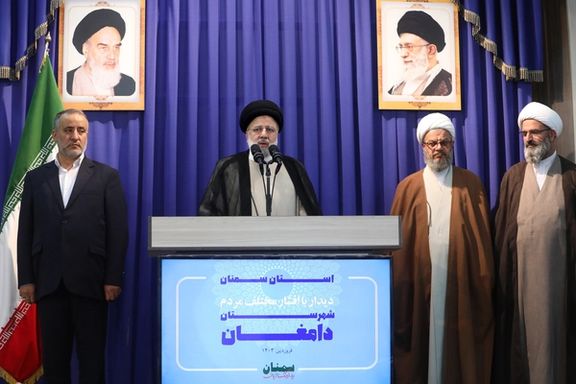
Iranian President Ebrahim Raisi avoided addressing Israel’s attack on the country on Friday, opting instead to praise Tehran’s own attack on Israel last week.

Iranian President Ebrahim Raisi avoided addressing Israel’s attack on the country on Friday, opting instead to praise Tehran’s own attack on Israel last week.
Raisi described the recent attack on Israel as a “unifying” event that was supported across all Iranian political factions.
"All groups and political streams believe that the attack on Israel was a necessary action, unifying and a great honor for the country," Raisi stated during a visit to Damghan in central Iran.
His comments come as the Islamic Revolutionary Guards has put pressure on media and journalists not to write or publish anything critical of Tehran’s attack on Israel last weekend.
The IRGC-linked Tasnim News Agency published a statement on X earlier this week that said the Guards were about to start "to deal with Israel's supporters on social media."
The statement called on citizens to turn in those who support Israel on social media.
While multiple reports confirmed that Israel had carried out an airstrike – the Iranian government quickly downplayed the claims, suggesting instead that the explosions were caused by the interception of microdrones by Iran's air defenses, attributing the incident to "infiltrators".
Tehran appeared to indicate that it has no plans for retaliation, in a likely bid to avoid a full-scale war with Israel.
That stance was echoed by a senior Iranian official who spoke to Reuters, who said "the foreign source of the incident has not been confirmed. We have not received any external attack, and the discussion leans more towards infiltration than attack".
Israel has not yet confirmed its role in the attack on Iran, although it had previously announced intentions to retaliate.
Iran’s attack on Israel last weekend saw over 300 drones and missiles launched, with 99% of them intercepted by Tel Aviv and its allies.
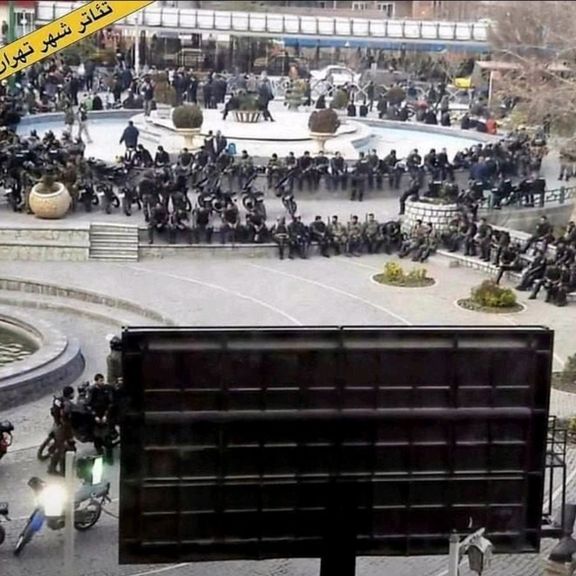
Traffic analysis on X reveals that Iranians have significantly tweeted more about the recent escalation of the hijab crackdown than about the heightened tensions between Iran and Israel.
Iranian media Thursday widely reported that the number of Persian tweets about tensions with Israel rose to nearly 6,000 on Tuesday when less than 2,000 users tweeted about the hijab crackdown.
On Wednesday, however, after a host of videos of harsh treatment of women and violent arrests by the morality police emerged on social media, tweets about hijab rose to around 7,000 and those addressing the tension with Israel dropped to a little over 2,000.
The violence used against women, in the past few days has angered many Iranians from every walk of life including those who support or praise Iran's missile attack against Israel last weekend as retaliation for Israel’s strike on the Iranian embassy in Damascus on April 1.
“Israel says it wants to attack but hardliners in Tehran have deployed the morality police battalions and are shutting down coffee shops like a dominos,” Mostafa Faghihi, chief editor of the conservative Asr-e Iran news website tweeted. Calling those responsible for the crackdown against women “ignorami” who fight Iranian women instead of Israel.
In the hours leading up to Saturday's missile and drone strike on Israel by the IRGC, Iran's morality police intensified their efforts against unveiled women. Additionally, Iranian authorities initiated crackdowns on media and social media activists.
The police force’s infamous “guidance patrols”, often referred to as the “morality police”, have returned to the streets, Tehran’s metro stations, and other cities across the country in full force, to enforce the Islamic dress code.
The patrols consisting of male and female uniformed police personnel as well as plainclothes agents have arrested hundreds of women and in at least dozens of cases women the arrests, as videos and reports on social media attest, were very violent.
Iran International has spoken to several women who say they were assaulted, verbally abused, and sexually harassed by arresting morality police officers and plainclothesmen who helped them.
One of the detainees, a 17-year-old girl, recounted to Iran International her violent arrest at Tehran's Daneshjoo Park. She described police officers pulling her hair, striking her arms and thighs with a baton, and directing sexual slurs at her. Moreover, she stated that women who resisted arrest, mostly very young, were assaulted by an officer while in the police van.
A 19-year-old woman who was also arrested violently told Iran International that at a detention center plainclothes officers tased her in the stomach and genitals, hurled sexual profanities at her and her family members.
Both females were forced to provide full details about themselves and their family members, including their phone numbers before being released.
Citizen reports on social media also allege that many girls detained by the morality police were minors as young as twelve years old.
During his election campaign, President Ebrahim Raisi had promised to clampdown on government officials for inefficiency and corruption instead of the so-called “[Moral] Guidance Patrols” for hijab.
"Khamenei acknowledges the increasing courage of Iranians in challenging the ruling establishment's beliefs and imposed red lines," said Iman Aghayari, a journalist and political analyst based in Turkey. "He refers to the 'imposed challenge of hijab' and, in a play on words, disguises his aggressive stance towards society as a form of defense," Aghayari told Iran International.
Authorities say they are fighting against behavior that is "against the society’s norms" but what they refer to as abnormality is in fact the lifestyle that people have chosen and is completely normal for most Iranians, Aghayari added.
“With the summer approaching, when more women shed their long headscarves, and the anniversary of the Woman, Life, Freedom movement drawing near, the hijab challenge is likely to intensify in the coming months, too,” he said.
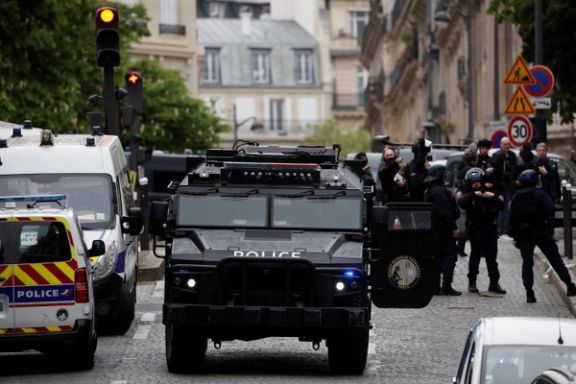
A man who had threatened to blow himself up at Iran's consulate in Paris was arrested by police, a police source said.
A police source had told Reuters the man was seen at about 11 a.m. (0900 GMT) entering the consulate, carrying what appeared to be a grenade and explosive vest. Police cordoned off the area.
The man later left the consulate and on being searched was found not to be carrying any explosives, a police source said.
Le Parisien newspaper said on its website that, according to several witnesses, the man had dragged flags on the floor of the consulate and said he wanted to avenge the death of his brother.
It was unclear whether the incident had any link to current tensions between Iran and Israel.
Earlier on Friday, explosions echoed over the Iranian city of Isfahan in what sources described as an Israeli attack, but Tehran played down the incident and indicated it had no plans for retaliation - a response that appeared gauged towards averting region-wide war.
(Report by Reuters)
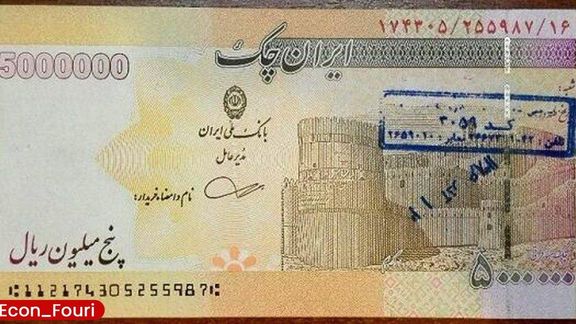
Iranian Central Bank officials are denying that the government is considering introducing a large-denomination bill into its circulation.
As the country’s currency, the rial (IRR), continues to depreciate, reports surfaced suggesting the government may bring in a 5 million rial banknote, approximately valued at $7.
Valued at 2 million Rials, the country’s highest banknote in circulation, is barely sufficient to purchase goods worth slightly over three dollars.
For years, inflation and currency fluctuations have eroded the purchasing power of the Rial when compared to other major currencies.
The rial has undergone dramatic devaluation over the decades. Before the 1979 Islamic Revolution, for instance, one US dollar could buy 70 rials.
By early 2018, this surged to about 40,000, and it has since skyrocketed to 670,000.
This depreciation accelerated following the US exit of the nuclear deal in May 2018 and the reimposition of economic sanctions, including on oil exports and international banking activity.
As of August, the country’s monetary base has grown at a rate of 41%, resulting in the government printing about $460 million monthly.
Since taking office in 2021, President Ebrahim Raisi has increased the growth of the monetary base by about 10%.
The monetary base refers to the amount of money in circulation plus the reserves by the Central Bank. Its expansion can lead to inflation.
The introduction of larger banknotes would have social implications, particularly for foreigners exchanging money in Iran who often receive large quantities of rial banknotes for relatively small amounts in dollars or euros, which can be inconvenient or cumbersome to manage.
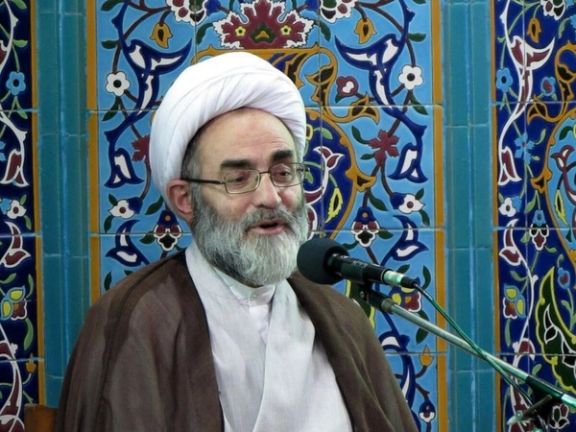
Amidst global media attention on tensions between Israel and Iran, the Supreme Leader's representative in Gilan province suggests that the state should "seize the opportunity" to enforce the country's Islamic hijab laws.
Cleric Rasul Falahati, who leads Friday prayers in the northern city of Rasht, directed his criticism towards media outlets run by the Iranian diaspora, emphasizing the need to act.
"The opposing media, which supports society's current environment of hijab abolition, is now involved in fake Israeli affairs, so we must seize the opportunity and deal with the situation," Falahati said.
Parallel to Iran's direct targeting of Israel over the weekend, the police announced their new hijab enforcement initiative, known as the Nour (Light) Plan, in response to what they claim is a “national and public demand."
Since then, social media has been flooded with videos demonstrating the widespread presence of the so-called morality police and their violent behavior.
While the recent crackdown happened after Supreme Leader Ali Khamenei repeatedly underlined that ignoring the hijab is a red line that should not be crossed, an official close to Khamenei quoted him on Friday, seemingly taking a cautious approach.
Mehdi Fazaeli, deputy chief of the Office for the Preservation and Publication of the Works of the Leader of the Revolution, said the leader had cautioned some officials not to undertake any “irregular and unplanned” actions regarding hijab.
Similarly, Gholamhossein Mohseni Ejei, the head of Iran's judiciary who had called for stronger implementation of hijab laws in early April, on Friday said: “In the matter of chastity and hijab, one should act wisely. We do not want to punish anyone who ignores the rules on the street.”
Although the signal coming from the regime’s authorities has not always been coherent or consistent, the reality on the street shows that the oppression facing women regarding the hijab law has been stepped up massively.
The morality police had largely disappeared from the streets following the death of Mahsa Jina Amini, 22, in their custody, which sparked widespread and months-long protests across the country.
Several women arrested by the morality police during the latest crackdown since the weekend have told Iran International of severe physical violence as well as sexual verbal abuse.
Women's rights activists have voiced their concern over the regime's increased clampdown on hijab laws, which has gained momentum since Saturday.
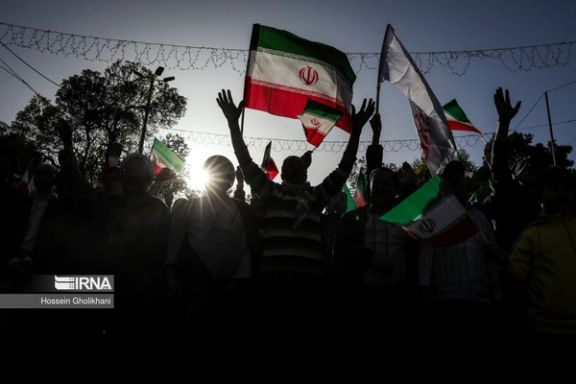
The head of Revayat-e Fath Foundation, an IRGC-affiliated cultural center, said the foundation is going to produce cinematic works on Iran’s offensive against Israel.
Hailing Iran’s missile and drone attacks, Ali Moqavasaz stressed that Revayat-e Fath Foundation intends to memorialize the “historic day” through backing artworks glorifying the event and also organizing a festival.
So far, no filmmakers have announced their readiness to produce works in this regard but we aim to take a serious action and make films about Israel, Palestine and the Islamic Republic’s missile and drone attacks against Israel, he went on to say.
Iran launched a barrage towards Israel on Saturday night of over 350 drones and missiles, most of which were intercepted by Israel and its allies before reaching Israeli territory.
The attack, Iran claims, was retaliation for the alleged Israeli airstrike on the Iranian consulate in Damascus this month, in which a senior Quds Force commander was killed along with other IRGC personnel.
Moqavasaz also pledged that Revayat-e Fath is going to produce cinematic productions about IRGC commanders. However, he did not elaborate on the identities of the financiers of these projects.
The Iranian government does not clearly announce the amount of funds allocated to many state-sponsored organizations and institutions, and the details of their expenditures are not reported at the end of the year.
Four years ago, Revayat-e Fath made a feature film named “Sniper” with a budget of at least 100 billion rials (around $400,000 at that time). The film, which narrated the adventures of a sniper during the Iran-Iraq war, was evaluated by critics as “low quality.”
The foundation also produced in 2011 the notorious movie “Golden Collars” directed by former intelligence officer Abolqassem Talebi. The movie garnered harsh criticisms from the public for its reproduction of the regime’s account of the Green Movement, the unprecedented protests following Iran’s controversial presidential elections in 2009.
Revayat-e Fath Foundation is named after a series of documentaries produced by renowned pro-government filmmaker and author Morteza Avini about Iran-Iraq eight-year military conflict. Iranian officials and state media frequently credit Avini for his ideas of “Islamic and revolutionary art and cinema.” Revayat-e Fath literally means “the narrative of conquest.”
Following the 2022 uprising triggered by the death in morality-police custody of Mahsa Amini, former head of Revayat-e Fath Foundation Mohammad Naderi lambasted artists who supported the nationwide protests, many of whom were threatened with travel bans, work bans and even prison.
“A number of famous figures have been openly and publicly kicking [the government] over the past months. This is our fault because some institutions and organizations were busy making celebrities and ignored the real artists”, Naderi said, further adding that the protesting artists were “useless figures and celebrities” who “betrayed the government, people and country.”
In October, the Iranian government officially released a list of actresses who are prohibited from working in the film industry due to refusal to wear the mandatory hijab. The list includes several well-known figures in the Iranian film industry, such as Baran Kosari, Vishka Asayesh, Taraneh Alidousti, Katayoun Riahi, Panteha Bahram, Hengameh Ghaziani, Pegah Ahangarani, and more.
"Due to the constraints they confront, these actresses will no longer be able to pursue their careers in cinema. Nevertheless, their previous works will be gradually released to safeguard the interests of film producers, given the substantial investments made in these projects. However, they will be barred from participating in any forthcoming film productions," said Habib Ilbeigi, the director of the Supervision Department in the state-affiliated Film Organization.
Despite spending a lot of money, the films and series produced by the Iranian government, tasked with promoting the ideological worldview of the Islamic Republic, have not been able to win the public’s approval in Iran, with some even becoming the butts of ridicule and mockery.
In January, a scene from a TV series was shared extensively by social media users in Iran as it depicted clerics being attacked by security forces several decades ago. Broadcast on Iran’s state TV, “Motherland” (“Sarzamin-e Madari” in Persian) covers the sociopolitical history of the country over a time span of 37 years, from 1942 to the birth of the Islamic Republic in 1979, according to the ruling regime's ideological prism. IRGC-affiliated Fars news agency has hailed the series as “the narrator of the ups and downs of the history of Iran in the contemporary era.”
In one scene, which is apparently aimed at promoting an oppressed picture of clerics during the reign of Pahlavi monarchs in the 20th century, security forces are shown to be shooting and killing clergymen. The scene went viral on X and Instagram as Iranian users remixed it with happy, celebratory and heroic songs in what can be interpreted as an explicit gesture of opposition to the theocratic government in the country.






